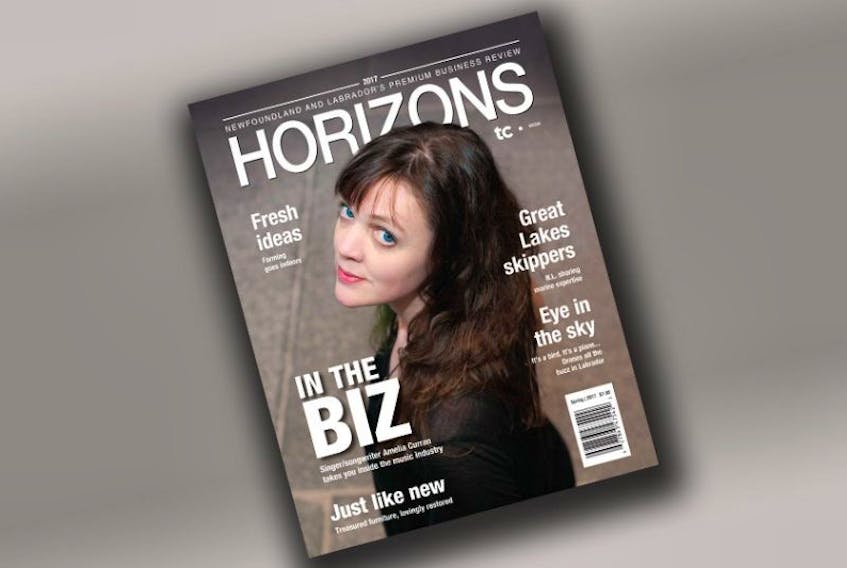Her performance had stunned the audience at the Winterset Festival into silence, with host Jamie Fitzpatrick saying, “if loneliness is the universal pain and music is the universal consolation, then she is one of the great consolers.”
And lonely she looked, too, the sunlight spilling in through the open door across the floor, though she was clearly an artist on her way up. There were simply no copies of the CD left anywhere — the album would later be signed and rereleased to much acclaim by Six Shooter Records.
It’s a different world for Curran now, and yet strangely the same. She’s promoting her eighth album, “Watershed,” still with Six Shooter, in a business which has flipped on its head. She’s a Juno Award-winning and East Coast Music Award-winning songwriter, writing on this album about inequality and the stigma of mental illness.
“This is much more focused. This is an activist record. This is the flag I’m waving. This is the flag I’m going to continue to wave,” Curran says. “In a way, on this record, I’m reaching out to my fellow activists and trying to say, ‘You’re not alone. I’m going to help you push this rock up this hill.’ And perhaps, on the less shiny compassionate side, if people are not going to help us push this rock up this hill, then the least they can do is to get the hell out of our way.”
A red and black tattoo curls up her arm from her wrist and out of sight into the sleeve of her jacket. It’s cool in the back room at Rocket Bakery. It’s her second media interview of the morning. An olive green coffee cup sits near her elbow; she reaches for it reflexively, though it’s stubbornly empty. The small round table, side-on against the wall, has a slight wobble.
Some things haven’t changed.
Challenges
“I think that behind the scenes, it’s still really hard for an artist to get paid, and there’s a lot of ‘Well, that’s just the way it is.’ And I think that ‘well, that’s just the way it is’ is our problem with a lot of things, and not just the music industry. … I think that individual citizens have forgotten their sense of power to change things. We got used to not listening.”
It’s a long way from 2007 Eastport.
“The business has not only changed a lot, it’s changed a lot several times over. It’s changed so much that I don’t know that I’d have the skills to go back to being an independent musician if I wanted to,” she says.
Curran can remember sending promos to festivals in MP3 files on floppy disks. She’s still fond of CDs and is a regular buyer. But now, her image is managed, as is her social media presence — even if she doesn’t always match the portrayal of her that her music label has created.
“You make a piece of work and it’s exciting and I like to talk about it. That’s fine. (But) I struggle with the image that’s created for me to play,” Curran says.
“I mean, that sounds really bad. There are so many people working behind the scenes, churning away, and it’s hard work and they are really good at it, and I have a lot of affection for everyone I work with, but in a sense, there’s this image and this role created for me, and then I’m set off into the world to play that role, and sell that image, and I can’t necessarily do that. A little bit of their work is bound to be undone by me, because I can’t necessarily turn into that person.”
The cornerstone of the music industry is still constant motion.
“I often say I make a living like a shark, because you can’t stop a shark, it can’t stop swimming. I cannot stop touring,” Curran says. “In the music industry, I make my money like a travelling salesman, I go around and I play my shows and I sell my products, and then I move on to the next place. And that is the only way I make a living. … None of us were ever sitting back and watching the paycheques roll in. You have to go and get it and fish for it.”
And there’s a lot of that fishing in a touring year.
“You have to commit to at least 200 days on the road — and some people love that, for some people that’s the dream — and I like being on the road or I wouldn’t do it. But I don’t love the lifestyle, it’s inherently an unhealthy lifestyle, and you have to orchestrate it very carefully to make it a healthy work environment. That takes years. It take you 10 years to get good at it, and to be able to able to sustain it, and after 10 years, you get pretty tired of the whole thing anyway.”
Image
On top of that are the industry’s new burdens: it’s not enough to write music and sing. You have to be a personality as well, and you have to be available.
“I really can’t stand social media. It’s more than that I have a dislike for it, it’s that I can’t live with it. I can’t do it. … But if you don’t have Facebook and Twitter and Instagram and all this stuff, you’re somehow illegitimate.”
She emails longer Facebook posts and handles her Twitter account. Her label does most of the rest.
“If it wasn’t for them, I wouldn’t be there at all. And honestly, I look forward to not being on social media,” she says. “When one person makes a comment to you, it’s the Internet — it feels like the whole universe has made that comment to you. You take that into your day to day life.”
And if you’re one of the people streaming her music for nearly nothing?
“I don’t think it’s their fault. … It’s easy for them to get their music for free. I have a big problem with the large companies that have made it so easy for them to get their music for free,” she says.
The music industry “turned into the skid, we drove right into it and dove right into this free stuff and said, ‘Fine, take it for free, here we go. My stuff is going to be more free than yours.’”
It’s made for a strange dynamic.
“We’re (at) the point that, if I sell someone a CD for $20, more often than not, I am handed that $20 bill as though it was a charity contribution, even though that is just what this product costs. But because they’re not going to Spotify — they’re buying the CD — it feels good to do that, they feel like they’re supporting something. And in a way they are — but it’s too bad that that’s where we’ve landed.”
The real Amelia
Where does she want “Watershed” to land?
“I want to inspire change, and I want to inspire people to make change and remember that they can. And to remember that change has never happened without people. We can actually make changes for the good, pick up the work towards equality, because we dropped it, and I think we can pick it up.”
On a personal social media note?
“Dear online audience, you want me to be a real person and accessible and ‘on’ all the time. I’m a person. Sometimes, I’m going to be just like you and be in a real shitty mood, and say real shitty things, and sorry, you asked for it.”
Curran shrugs. “I would like permission to disappear a little bit, too.”









